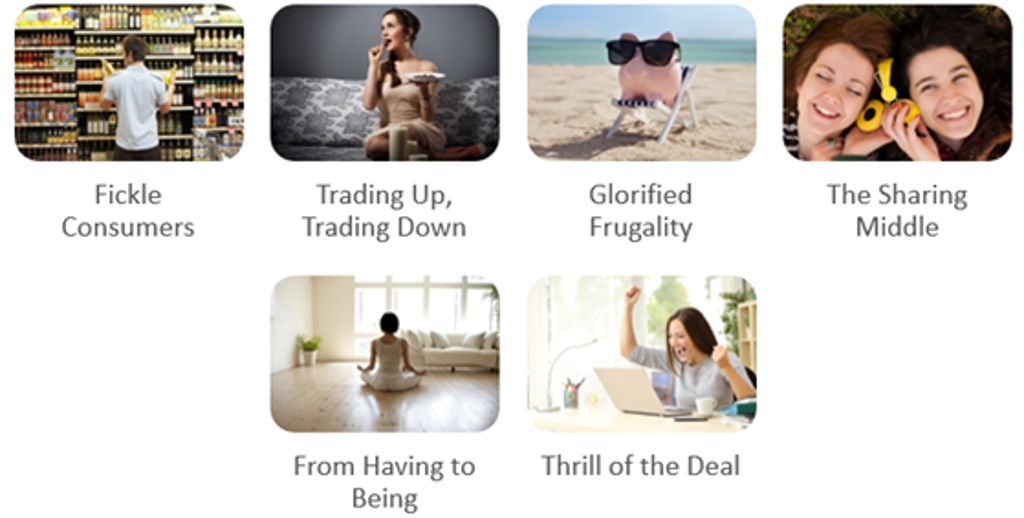Global middle class consumers are increasingly shifting away from conspicuous and wasteful consumption towards more selective and conscious spending, in a megatrend we at Euromonitor International have called the Middle Class Reset. This shift in the middle class mindset and their consumption choices will be long term and will contribute to shaping the global consumer market of the future.
Drivers of the shift away from overconsumption
Five key factors are at play to drive, and accelerate, this shift. These are:
- Squeezed incomes for middle class households, especially in developed countries: to maintain their standard of living, the majority of middle class households need two income earners, as well as to adjust their consumption habits to make the most of their limited resources;
- Demographic shifts and population trends: urbanisation, migration, ageing and rising health awareness are all combining to reshape consumers’ lifestyles and purchasing decisions;
- Environmental concerns: these are particularly acute among middle class consumers, even though their conspicuous consumption in the past has put pressure on the environment;
- Technological change: technology empowers middle class consumers by giving them more information and more choice, shaping their expectations as well as giving rise to e-commerce and online platforms;
- Changing values: one of the most important changes in terms of the attitudes and priorities of today’s middle classes is the greater emphasis they place on convenience and ways to simplify their life, while less importance is attached to the accumulation of material things.

How are consumers shifting away from conspicuous consumption?
The Middle Class Reset manifests itself in six key trends:
- Fickle consumers: middle class consumers are typically difficult for brands to connect with and cultivate loyalty, as they are better-informed and digitally connected. Their purchasing decisions are driven by the pursuit of value (and value is more than a nice price);
- Trading up, trading down: middle class consumers often compromise in some categories in order to splash out in others. Also, they trade up and down simultaneously in the same category (for example, trading up in quality but cutting back on quantity);
- Glorified frugality: middle class consumers are increasingly frugal, as they “make do and mend” and also sell their used items. Affordability is key, but reducing waste (and thus, environmental impact) is also an important factor;
- The sharing middle: sharing, renting and borrowing what is needed, especially when it is required only sporadically, allow the middle class to access goods and services without the cost of ownership;
- From having to being: as they choose to own less, middle class consumers can instead direct their spending towards doing, seeing and feeling things that they really enjoy;
- Thrill of the deal: middle class consumers scale back their spending and economise not only out of necessity, but also because saving money and bargain-hunting have become cool, exciting things to do. The hunt for the deal is as exciting as the deal itself.

As a megatrend, the Middle Class Reset started off in developed markets, where the squeezed middle class after the 2008-2009 financial crisis changed their consumption habits in an effort to optimise their limited resources. However, in emerging and developing economies, even as the middle class continues to expand and enjoy rising incomes, middle class consumers are also seen to increasingly shift their consumption behaviour away from conspicuous consumption, which was previously considered a marker of success. Increasingly, businesses in emerging and developing markets are responding to trends pertaining to the Middle Class Reset:
- In July 2021, supermarket operator Carrefour launched the Carrefour Bio line of organic food in Brazil, which claims to offer superior quality at prices up to 30% lower than competitors’ organic offerings. The company is able to offer competitive prices by adopting a localisation strategy, whereby products are sourced locally where possible. As such, Carrefour has enabled Brazilian middle class consumers to trade up to organic products that align with what matters most to them, which in the food space include superior quality, associated health benefits, good value for money, and reduced/low environmental impact.
- China’s leading second-hand platform, Xianyu by Alibaba, offers second-hand, recycled, refurbished, and for-rent products. Xianyu has gamification functions and hobby-based social groups. In China, during the pandemic, the hashtag #ditchyourstuff has trended in the media among youngsters, while the country has seen a boom in second-hand online sales. The COVID-19 pandemic has brought about a more sustainable, healthier, and “less is more” approach to consumption, with consumers becoming more conscious about what they consume, while they have also begun to ditch the stigma associated with used goods.
- Alibaba, which owns the Taobao Live platform, has made livestreaming shopping a central component of Singles’ Day. To keep viewers hooked throughout the 24-hour livestreams, viewers can “grab” vouchers that drop at unannounced times, and they can win prizes. Also, the more hours of livestream they watch, the higher their fan rankings and the better the deals. With livestreaming, Alibaba has made deal-hunting colourful, loud, entertaining and exciting, which in turn has contributed to making China’s Singles’ Day the largest online sales event in the world.
Further information about the Middle Class Reset can be found in our report, Megatrends: Middle Class Reset.
